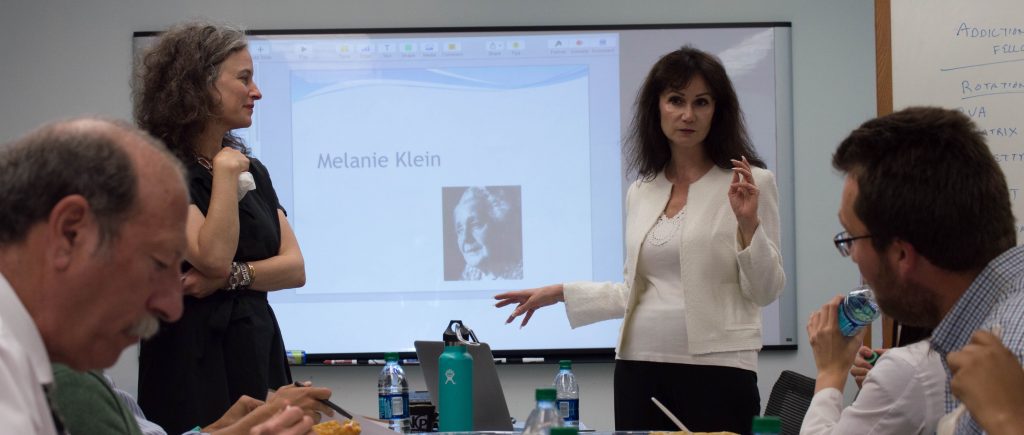Psychotherapy

At UCLA, we train residents in psychotherapy through a variety of clinical, didactic, and experiential learning modalities with an emphasis on factors common across all psychotherapy modalities. While emphasizing these universal prinicples, we provide training in the full spectrum of psychotherapies, from short-term to long-term, from psychodynamic to cognitive-behavioral, and with individuals, couples, families, and groups.UCLA also has an active Psychiatric Clinical Faculty Association (PCFA) with many volunteer faculty who have advanced training in psychotherapy and psychoanalysis, as well as a passion for teaching psychotherapy and supervising residents.
Outside of UCLA, Los Angeles has a large psychoanalytic community with multiple local institutes that offer short and long-term training programs that residents are encouraged to pursue.
All residents are required to be trained in cognitive behavioral therapy (CBT), psychodynamic, and supportive psychotherapies. The following are clinics which give core training in these modalities:
- Resident Psychotherapy Clinic (UCLA and VA)
- Anxiety Disorders Clinic (UCLA and VA)
- Cognitive Behavior Therapy Clinic (UCLA)
Interested residents can select elective psychotherapy experiences in a variety of modalities, some of which are listed below. Elective clinics are available at UCLA, the VA, and at other community sites. Dr. Blumenshine, along with the Track Directors, will work with interested residents to select electives of interest that will enhance their personal and professional development.
Clinics with Direct Patient Care
- Insomnia Clinic: CBT for Insomnia
- Trauma Recovery Services: Prolonged Exposure (PE) and Cognitive Processing Therapy (CPT)
- Adult OCD Clinic: Exposure and Response Prevention (ERP)
- Child OCD, Anxiety, and Tic Disorders Clinic: Habit Reversal Training (HRT), ERP, CBT
- Mindfulness-Based Cognitive Therapy
- Westside DBT: Dialectical Behavioral Therapy (DBT groups)
- Family Therapy Clinic: Family Focused Therapy
- Family Resilience Clinic (VA): Family and parenting interventions, Parent management/guidance training, and Family Therapy
- EMPWR Clinic – LGBTQ+ informed and affirming treatment, including trauma-focused CBT
Didactic Based Clinics
- Attachment-Based Intensive Short-Term Dynamic Psychotherapy (AB-ISTDP)
- Couples and Sex Therapy Training Program
The UCLA Resident Psychotherapy Clinic (RPC) provides a venue for our residents to treat patients using long-term psychodynamic psychotherapy as the primary modality. UCLA faculty (mainly volunteer members of the Psychiatry Clinical Faculty Association) supervise residents for at least one hour per week using process notes and/or other reporting techniques such as video or audiotapes from the psychotherapy sessions. Prior to graduation, residents will need to have seen at least two patients for long-term psychotherapy, meaning 42 sessions across a one-year period each. However, this is the bare minimum, and many residents opt for more patients. Residents typically begin seeing patients during their third year but can begin as early as PGY-2. There is no limit to the number of patients residents can see for long-term psychodynamic psychotherapy, and most residents exceed the required two patients.
The combination of personal and professional development continues in class process groups. Each residency class beginning in PGY-2 has the opportunity to meet for a weekly process group, facilitated by a volunteer member of the PCFA. These groups serve as a forum both for understanding group processes and for supporting each other through the ups and downs of residency.
Psychiatry residents at UCLA have the benefit of unfettered access to two world-class groups of faculty. One is the full-time academic faculty of the Department of Psychiatry. The other is the Psychiatric Clinical Faculty Association (PCFA). The PCFA is a group of 400-plus distinguished psychiatrists, most with full-time clinical practices, and many of whom are psychoanalysts affiliated with one of Los Angeles’ psychoanalytic institutes.
Psychodynamic psychotherapy is learned best under the tutelage of experienced supervisors, and the supervisory experience is essential to resident learning. During PGY-3 and 4, each resident can work intensively with volunteer supervisors from the PCFA. Our supervisors do more than teach us about psychotherapy; by meeting with us in their offices and being present for us as mentors and advisors, they expand our horizons and provide an invaluable source of insight into life after residency.
Each year, the PCFA also invites a pre-eminent psychiatrist to come speak to UCLA faculty and trainees at a special conference. Past speakers have have included Allan Abbass, M.D., Frank Yeomans, M.D., Salman Ahktar, M.D. and Andrew Gerber, M.D., Ph.D. Underlining UCLA’s focus on resident education, the seminar series always includes a dedicated trainee-only lecture and case conference, in which the speaker delivers a presentation tailored for the residents and a resident presents one of their long-term psychotherapy cases for discussion and analysis.
For more information, visit the PCFA website at pcfala.net.
Los Angeles is a major hub for psychoanalysis and it is therefore not surprising to know that there are many institutes in the area, including:
- Psychoanalytic Center of California
- New Center for Psychoanalysis
- Institute of Contemporary Psychoanalysis
- LA Institute and Society for Psychoanalytic Studies
- Jung Institute
Each of these schools has their own educational lecture series, and UCLA residents are often invited for free or at discounted rates. All offer short- or long-term training programs (one to two years, in the evenings) in psychoanalytic psychotherapy. Dr. Blumenshine can help interested residents explore these options and select learning opportunities that best meet the individual resident’s needs and interests.
Los Angeles attracts an enormous amount of conferences and lectures, some of which are affiliated with the aforementioned psychoanalytic institutes but by no means all. For example, each year UCLA hosts a three-day conference on Mentalization Based Treatment (MBT), put on by the Anna Freud Center from London. Lecturers include Anthony Bateman and Peter Fonagy, the original developers of MBT, as well as UCLA’s own professors Robin Kissel and Daniel Kupper. Residents are offered subsidies to attend this certificate-bearing conference, and this is just one of the many opportunities available.
